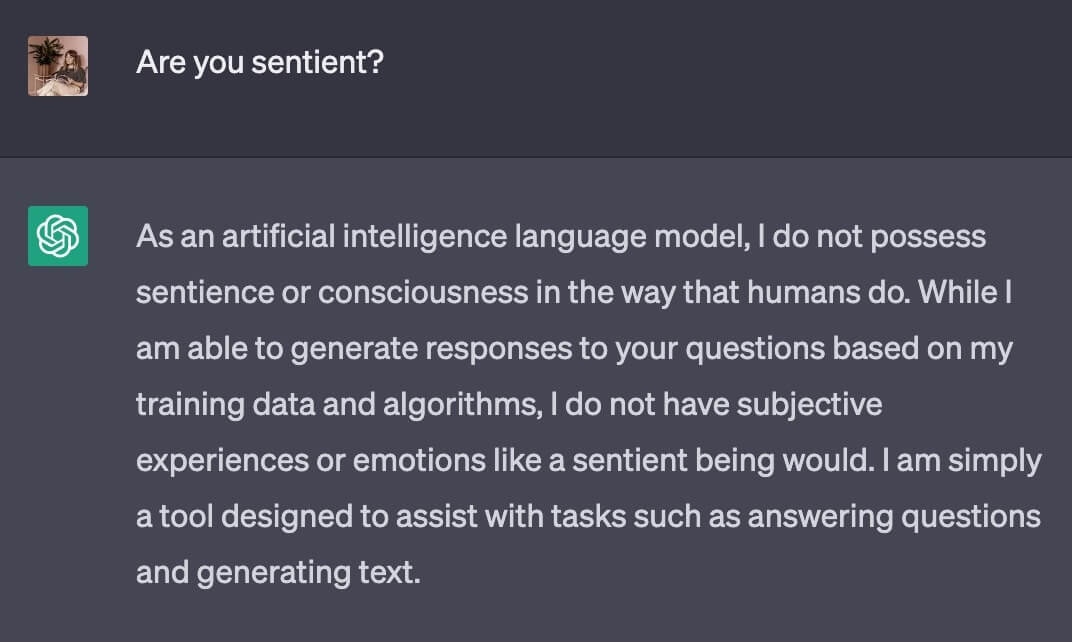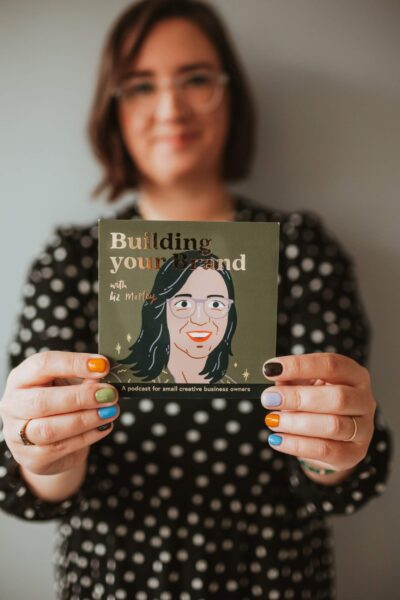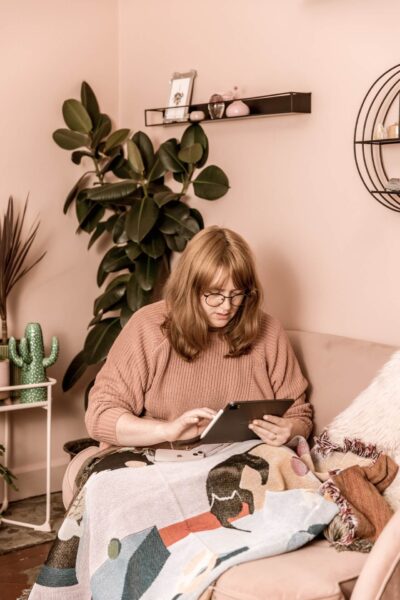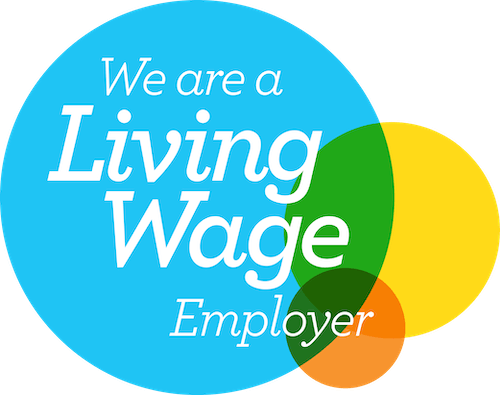As a content producer and copywriter, I’m not gonna lie – I’ve felt a little perturbed about the rise of AI, especially when it comes to all the things I (a human) can do for my small business clients.
I’ve seen people in all sorts of industries, small businesses and large corporations, singing the praises of using AI programs such as ChatGPT, and it got me a little worried – are robots going to take my job?
After a little more research and an example of how wrong ChatGPT can be (Studio Cotton founder Aime asked it for some information about me, and it was 99% wrong) I felt a little better, and was even brave enough to try it out for myself.
And d’ya know what? It’s not that scary, and it’s not coming for my job – yet.
Wait, hold up. Maybe I’ve gone a bit too far already and you’re sat there thinking, what the hell is ChatGPT and what the hell is AI?
(Sidenote: I remember the first time I heard the term “AI” back in 2008, and I thought it was something to do with aliens. Turns out it’s much closer to home.)
What the heck is ChatGPT?
Created by OpenAI, as US-based artificial intelligence (AI) research lab, ChatGPT is a dialogue-generating tool that can create answers, articles, sonnets and prose – pretty much any content in any style – with prompts from a user like you or me.
How ChatGPT does this? That’s not openly shared. We know the input is human-created content – i.e. stuff from the internet – but how it turns that input into its oft-impressive output is OpenAI’s secret.
It’s quickly becoming mega popular in the small business community, with owners, marketers and content creators using the AI tool to generate a tonne of text without the usual amount of time or creative burden writing usually takes.
This blog post was written about using the free ChatGPT model, however there is also ChatGPT Plus for $20/month, which gives you benefits such as it being available even when demand is high, faster response speed, priority access to new features, and more.

ChatGPT’s limitations
Let’s have a quick look at the ChatGPT limitations that flash up on the screen before you start a conversation with your new robot BFF:
- May occasionally generate incorrect information
- May occasionally produce harmful instructions or biased content
- Limited knowledge of world and events after 2021
Hmmm ok… a few pretty big disadvantages, but depending on what you’re using ChatGPT for, you can probably avoid going too far wrong, as you’re a lovely human small business owner who probably doesn’t want to share harmful or incorrect information.
Bearing in mind we’re now a third of the way through 2023, it sounds like ChatGPT could do with learning a little more recent info. But it’s important to remember that it isn’t a search engine – it’s not a tool looking for the best answers to your queries.
It’s creating dialogue – and sometimes that dialogue is totally made up. In some instances, it’d take just as long to fact-check the ChatGPT output as it would to write the content from scratch.
So yeah, ChatGPT is astounding, fun to play with, and it can get you past that blank-screen moment – but it’s also mysterious, unverifiable, and unpredictable.
If used in the right way, it’s a super helpful little tool. We thought it’d be helpful share some ways that small business owners like you and I can use it to our advantage, and also some things to avoid.
1. ChatGPT can help you write a blog post
If you’re struggling to start a blog post or aren’t sure of the best way to arrange the points you want to get across, using ChatGPT can be a good place to start.
However (and I cannot stress this point enough) do not just copy and paste from ChatGPT into a blog post and think you’re done. The blog post won’t be long enough, won’t be search engine optimised, and most importantly, it won’t sound like you.
We’ve mentioned many times how important your voice is in your small business, to create brand affinity and connect to the customer. People want to buy from people, so your customer wants to know what you’re all about.
Blog posts are soooo much better in soooo many ways when they’re subjective. We are so passionate about it that we wrote a whole post about it – 10 easy peasy ways to make a small business blog article mega subjective.
I thought I’d ask ChatGPT itself for tips on using it to write blog posts, and this is what it told me.
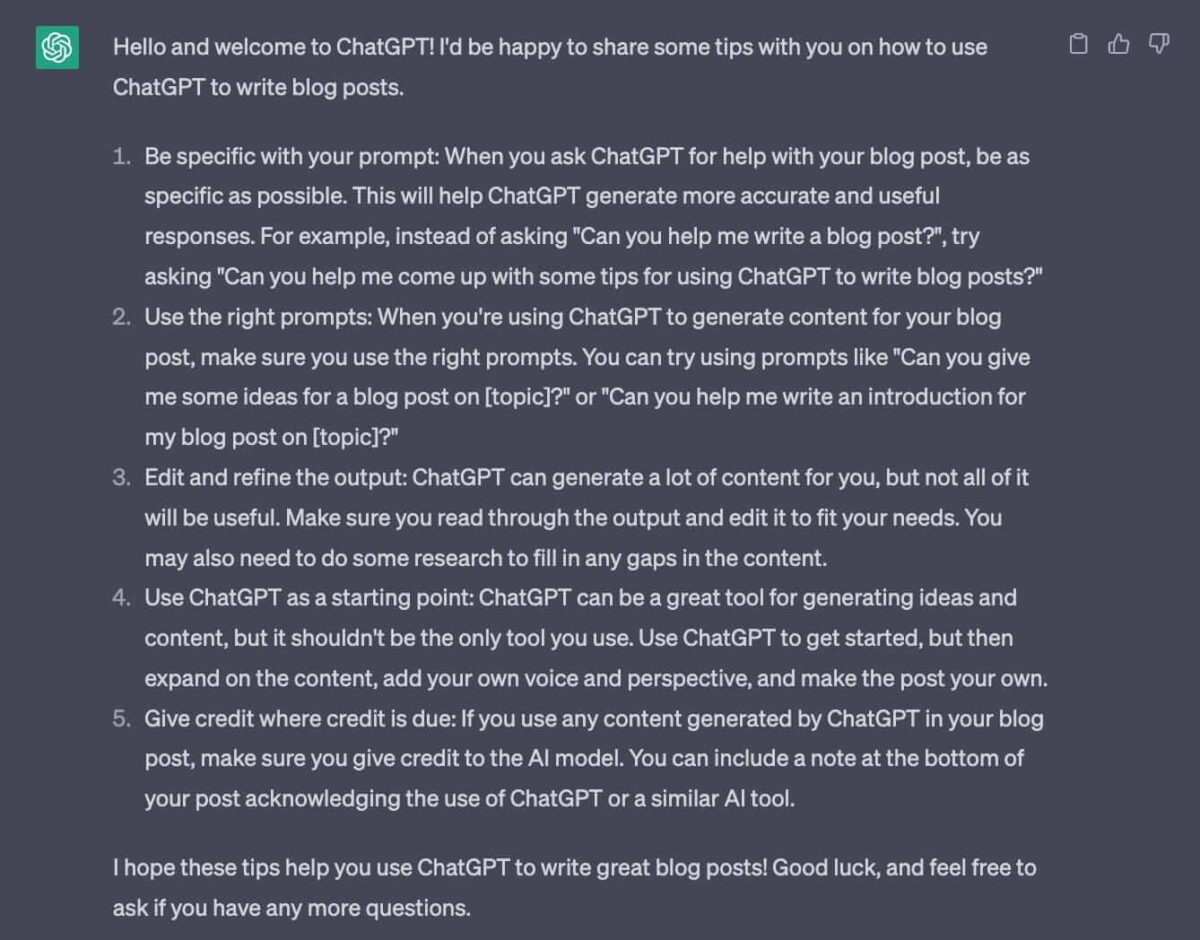
It’s honest about its shortcomings, and I’m really glad about that. ChatGPT should only be used as a starting point for your blog post, and does require a lot of further input from you. So soz, it’s not a total shortcut.
If you’re still finding blogging difficult, we’ve got you covered with looooads of articles that’ll help you write bangin’ blog posts.
2. ChatGPT can come up with neat small business Instagram hashtags
Aime did an experiment to see if ChatGPT could find some new Instagram hashtags.
She asked, “What Instagram hashtags do popular posts about knitting use?” and it gave a list of 19, as well as suggesting some more specific hashtags for the specific type of knitting. She said that they weren’t all winners, but it was so much quicker than typing them all out.
I then asked it for some small business hashtags, and though they weren’t anything new to me, they might be useful for small business owners who are just starting to use hashtags on Instagram.
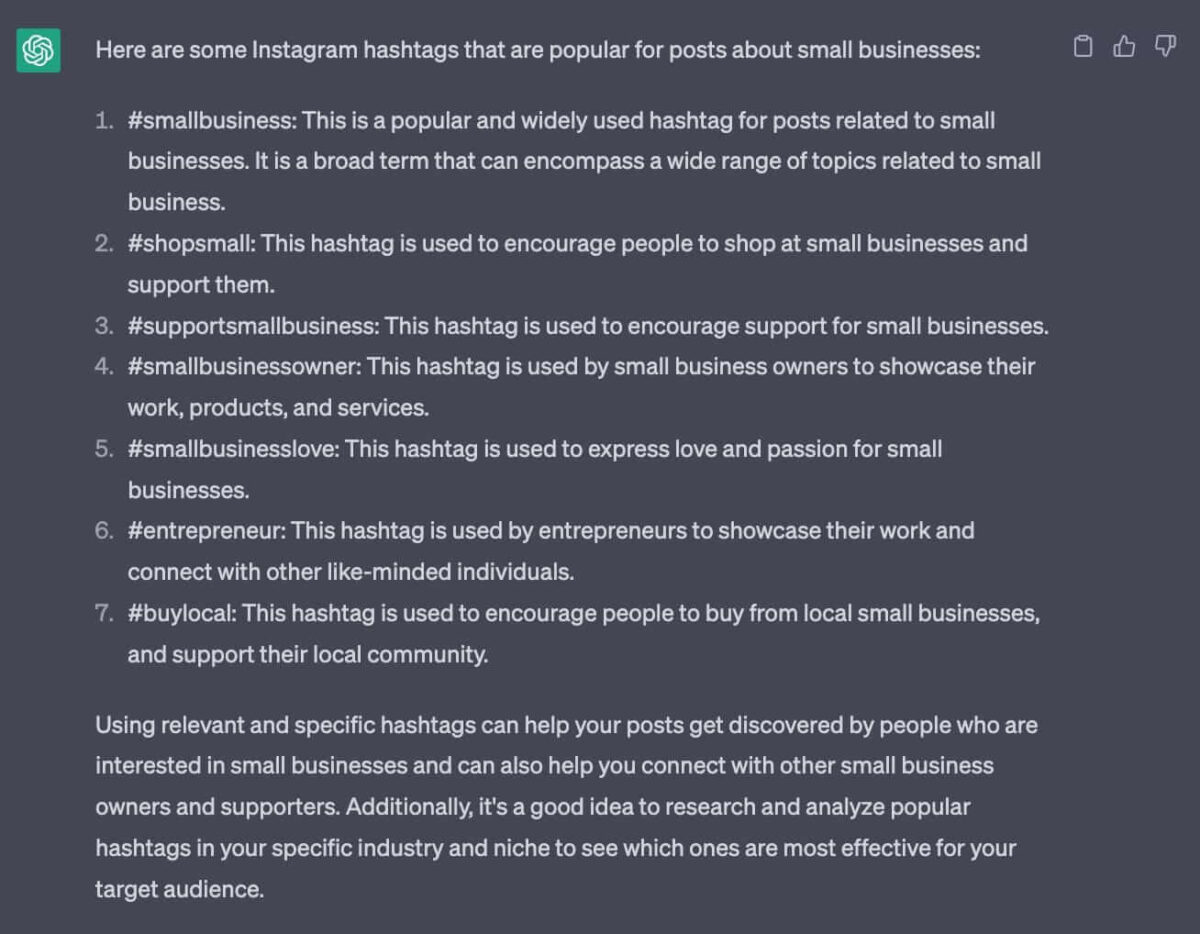
These are certainly a good starting point, but, again, it will take a little of your own research to find some really good Instagram hashtags for your small business niche. I did ask it to niche down but the results were still pretty generic.
3. ChatGPT can give inspire your small business’ tone of voice
Sometimes it can be tricky to write copy with a specific tone of voice. It’s easy to get bogged down in the points you’re trying to convey, and forget to add that all-important personality.
I prompted ChatGPT with, “please write a product description for a gold necklace, and make it sound a bit whimsical and fun. Maximum 140 characters.”
Its response was “Add a touch of magic to your outfit with this golden charmer! Twirl and sparkle your way through the day with this playful necklace.”
While that isn’t necessarily something I would write for a client, it certainly gets your brain thinking in a more whimsical way and gives you ideas for words that could be used.
I tried again with “140 words” instead of characters, and let’s just say it would not make it past Aime’s exclamation-mark-ometer.

4. ChatGPT can find keywords for your small business
Keywords are the words and phrases in your website’s content that make it possible for people to find your website via search engines such as Google. They’re, like, super important for telling Google what you’re all about.
Coming up with a list of keywords is hard, especially if you’re having a slow-brain-day. Just how many ways are there to say “acrylic jewellery” or “handmade wedding shoes”?
Well, it turns out a lot actually, and using ChatGPT can speed up the process of coming up with them. Just give it a specific prompt, and see those glorious keywords lining up.
We also have this handy keywords blog post from the archives, The easiest way to pick and use your brand keywords, if you want to have a bash at it without AI’s help.
5. ChatGPT can help write your product descriptions
Writing product descriptions for your online shop can be a laborious task, especially if you have a lot of products that are kind similar.
I asked ChatGPT for a whimsical description of some floral wedding shoes, and for the most part it was pretty good, and was definitely a good starting point.
However, it didn’t realise that the shoes weren’t made of real flowers, so it wrote a whole section about how fragrance of the shoes will leave your guests mesmerised. So that was my fault for not being specific enough… these examples are pretty good though.
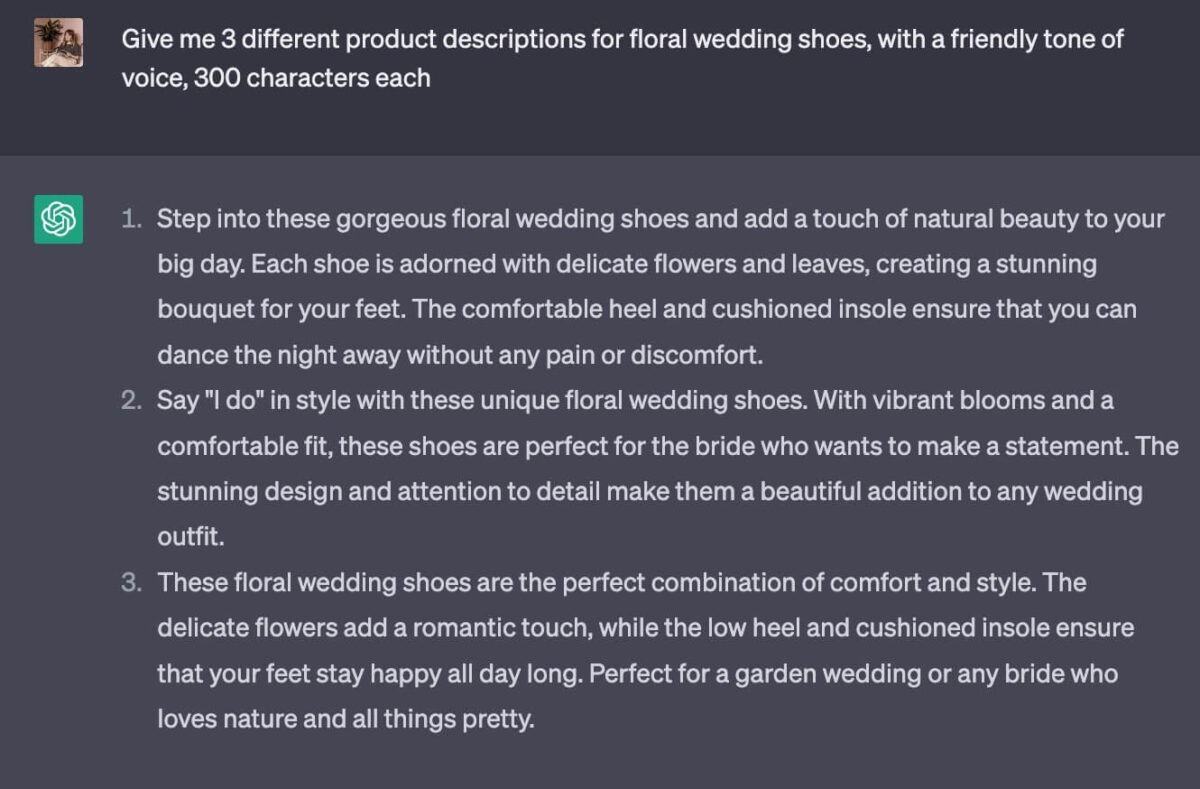
I would add in some more specific keywords, and possibly change the tone slightly to fit the brand better, but all in all – not bad.

SEO-ified product descriptions
We create utterly thorough and seductive descriptions that give your customers all the information they need and Google everything it loves.
Bonus personal use for ChatGPT
Ask it to draft a text message to an ex boyfriend who won’t stop sending flowers – thanks to Beckie Sims of The Leather Store for this amazing suggestion mentioned in the Studio Cotton Clubhouse. And yes – it worked.
Cons for using AI for content creation
So those are some ways that small business owners can use ChatGPT and similar AI to their advantage. How about a few cons?
Aside from the limitations ChatGPT tells you about, there are a few other negatives to note:
- Possible plagiarism
- A lack of creativity
- Less engaging copy
- Inconsistent quality
- Information may not be accurate or up to date
- Not able to form new ideas
- Works from existing, limited data
- A lack of nuance or context
- Facts are given without sources
- Repetition
There we have it. It’s probably time to accept that AI is becoming more widespread, and to learn to use it to our advantage.
Just make sure your prompts are succinct, you check the facts, and you add some personality and subjectivity into what you’re writing and you’ll do ok.
And lastly, because I know you’re probably all worrying about it as much as me:
